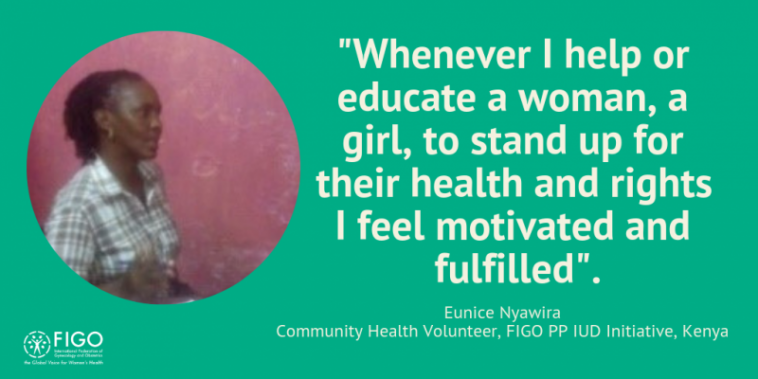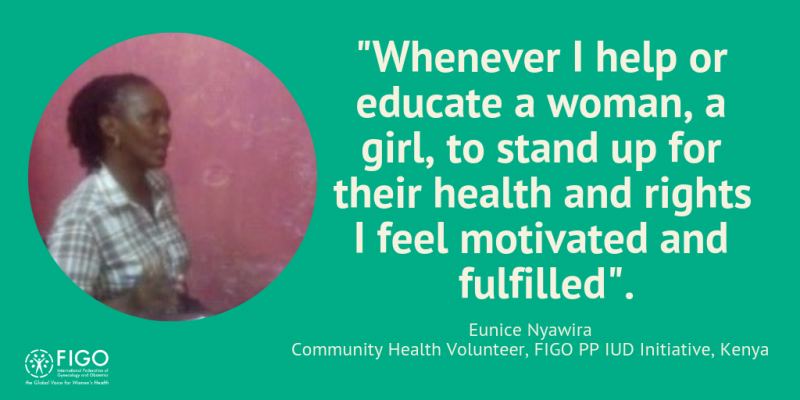Helping make an informed choice
More than one billion people volunteer globally – the equivalent of over 109 million full-time workers, according to the UN Volunteers' 2018 report, State of the World’s Volunteerism.


Resilient communities are healthy communities, and FIGO members around the world make a critical contribution. On the frontline of women’s health in 132 countries, they donate their time, expertise, and platforms to improve the physical, mental, reproductive and sexual health of women throughout their lives.
We are proud to celebrate their contributions.
Eunice Nyawira is a Community Health Volunteer (CHV) in Kenya, with FIGO’s Post-Partum Intrauterine Device (PPIUD) Project.
885 million women of reproductive age in low-resource settings want to avoid a pregnancy. 214 million of them have an unmet need for modern contraception, and the vast majority of post-natal women leave facilities without receiving any counselling or access. We work closely with community health volunteers who counsel, inform and support new mothers in making a choice about their reproductive health.
This collaborative approach is helping to establish the provision of IUDs - a long-term but immediately reversible contraceptive method - into routine maternity care across a number of countries.
What FIGO volunteer activities are you currently involved in?
As a CHV, I identify pregnant mothers in Nakuru County, mapping and encouraging them to come for early antenatal services. I advocate for PPIUD as the advantageous long-term method of family planning and follow up of postnatal mothers, and help them to make an informed choice on general family planning methods.
Why is this women's health issue important to you?
Women are the major agents of change, they are the backbone of the family. But they are often vulnerable in the societies we live in today, hence very much exposed to health issues. When a mother is healthy, maternal-infant mortality rate is low; but without financial resources they have limited access to health and community services.
What motivates you to volunteer with the PPIUD project?
I was once a victim of Gender-Based Violence. I was unable to make my own decision on anything, but the Women’s Crisis Centre rescued me, educating me on my rights and life skills. From there, I made a vow to God to fight for the right of women and girls through advocacy at the household level.
Whenever I help or educate a woman, a girl to stand up for their health and rights I feel motivated and fulfilled. Also the community has confidence in me, and this make it very easy to understand them and what is going on.
What has been your biggest accomplishment in your volunteer role?
Our community is increasingly well-informed on how, when and where to access health services such as family planning, antenatal care, postnatal services and general health care services.
We also see positive change working hand in hand with young girls who are exposed to Gender-Based Violence, who are physically challenged. Through trainings on life skills, their rights, entrepreneurship and vocational trainings, some are already getting a qualification, doing different courses such as hair dressing and catering services.
How has your life been shaped by other volunteers?
The spirit of teamwork has really worked, it has shown me that without other volunteers, we can’t achieve. They are my pillars, they are my source of strength whenever I have a difficulty in the field, I can reach out to any CHV available and join hands. They correct me whenever I am wrong. They help me hold on.
This interview appeared as part of a wider series celebrating FIGO volunteers. Find more stories here.